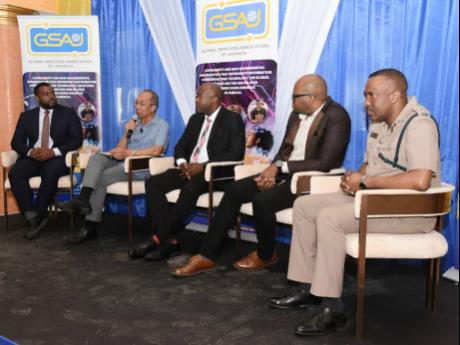Police tightening loopholes around data theft
ST JAMES’ SENIOR Superintendent of Police Vernon Ellis says significant strides have been made in the fight against information theft in Jamaica’s outsourcing sector.
Ellis was speaking during a panel discussion at the Global Services Association of Jamaica President’s Breakfast Forum in Montego Bay on Thursday.
The senior superintendent shared that, with the introduction of the business process outsourcing (BPO) sector in the early 2000s, the island also saw the start of lottery scamming in Montego Bay.
This, he pointed out, was made possible by a lack of extensive security measures to protect identity information at these BPOs.
“So by early 2006, we saw where persons were using these identity information to tell people that they won something from a lottery and they were to pay some advance fees to collect what they won,” said Ellis.
The senior superintendent said that during this time, lawmen also encountered difficulties in their attempts at policing this growing concern, as there was nothing in the Jamaican laws that spoke about lottery scamming-related offences.
“So for the JCF, it was very difficult to really prosecute persons for this because while we had the Larceny Act, there was nothing geared around protecting identity information or looking at the data itself. But by 2010, it started affecting our murder rate in a way where it started to go south,” Ellis explained.
However, the introduction of the Lottery Scam Task Force in 2013 made a major shift in how lawmen were able to police this offence and how BPOs secured their data, Ellis said.
The senior police said that this task force assisted the JCF to forge a partnership with the BPOs across the parish to protect their clients’ data. In addition to that, the Lottery Scam Task Force also brought to light how data was being stolen by scammers.
“They agreed that we needed a task force to start looking at the BPOs, how we help the BPOs to secure data, how we would target persons who were involved in lottery scamming,” Ellis said.
“When we started out in 2013, we saw where the task force was going after persons, some of them were connected to the BPOs, with identity information. We saw where the gangs were forcing people to get this identity information out of the call centres to give them,” the senior police added.
The introduction of the Law Reform (Fraudulent Transactions) (Special Provisions) Act 2013 also gave the police well-needed teeth as they could now prosecute individuals found in possession of identity information.
“We saw a big shift at that point and the task force expanded in training the divisions around Jamaica and they formed an investigation unit in each parish,” said Ellis.
Through additional partnerships and enforcement efforts, Ellis said that the BPO sector was better regularised with added security to discourage lottery scamming.
“We went into the BPOs, there were a lot of lectures and we supported them with the vetting process of employees. Persons were required to have criminal records done before employment,” said Ellis.
“We had the bilateral support through our foreign partners who came to help with a bigger task force,” he added.
On Thursday, Minister of National Security Dr Horace Chang disclosed that approximately 100 individuals have been identified for extradition to the United States of America for lottery scamming-related offences.
He said that the government is committed to fight against this criminal activity as it has many implications for the Jamaican economy.
In the meantime, Dr Chang said that the Data Protection Act was passed in 2020 and has been in force since December 1, 2023.
“The Government is already making the necessary investments in these areas and has positioned our law-enforcement agencies to provide leadership and support through research, innovation, and specialised training, as we pursue national economic development while guaranteeing your cybersecurity,” said the minister.
The JCF has made 450 arrests for lottery scamming-related offences since 2016, with over 400 of those individuals being charged. There have also been 29 extraditions and 62 convictions to date.

